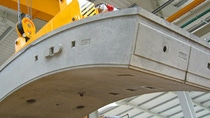Sustainability
Sustainability
"We drive sustainable solutions." This is one of BASF's four strategic principles. Nanotechnology is indispensable for this purpose.
It enables us to develop resource-conserving products, ensure healthy food and nutrition and improve people's quality of life. In doing so, we strike a balance between economic success, social responsibility and environmental protection.
Example environmental protection and economy: Only by using nanotechnology can we save large amounts of energy and thus also costs in many different sectors. At the same time, nanotechnology reduces carbon emissions.

